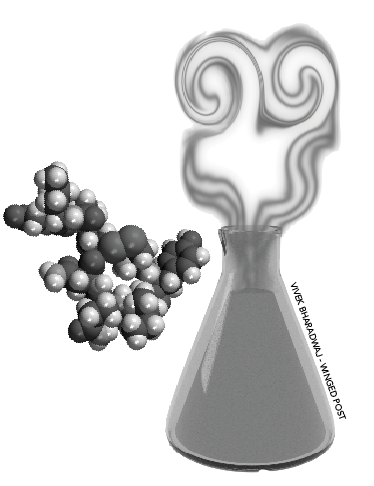The chemistry behind good chemistry

The oxytocin molecule pictured above promotes bonding in both humans and other animals.
Love is a seemingly intangible emotional concept, a purely subjective experience that varies from person to person. Society and the media influence our perception of the emotion, evident from the commercialization of Valentine’s day and the endless stream of romcoms showing at theaters each February. Yet though there are so many nuances to love, from the way people exhibit it to the reasons they do, we all share a reaction as Homo sapiens. have in common the feelings it gives us in some way or form.
While the sensations of warmth and happiness associated with love may seem magical, they are really caused by biochemical reactions in our brains and emotional psychology, not Cupid. At each step of the romantic process, from love at first sight to bitter heartbreak, chemicals in the brain play a specific role. While first falling in love, brain receptors release a hormone called dopamine which has a similar effect to that of drugs like cocaine.
While obsessive actions are often associated with deep emotional attachment, Dr. Donatella Marazziti of the University of Pisa has found that this obsessive behavior is actually caused by lower levels of serotonin, a calming hormone, found in people who are falling in love.
While true love does breed attachment, so do other hormones such as oxytocin and vasopressin, the same hormones causing mother-child attachment. According to upper school science instructor, Jeff Sutton, “oxytocin develops bonds and relationships between humans, so touching can help stimulate that, hugging too.”
Though breakups may be commonly thought of as a depressing ending to what could have been, genetically, they signify the failing of a human’s main goal: continuing the human species. While most people believe that the depressing post-breakup traditions such as eating too much ice cream and watching too many movies come from the loss of a lover, Dr. Helen Fisher of Rutgers University instead believes that rejection carries many similar symptoms to addiction such as “separation anxiety” and illogical attempts to regaining the affection of their partner. Maybe that age-old cliché of drunk phone calls can actually be attributed to a biological response and not a lack of common sense.
Whether or not you believe in true love, the reactions and feelings that come with the phenomena do have a basis in biology.
This piece was originally published in the pages of the Winged Post on January 28, 2015.

Vivian Isenberg, a senior, is the Humor & Satire editor on Harker Aquila. She was a member of the yearbook staff her freshman year and has been on...
Maya Kumar (11) is the Features Editor for the Winged Post. This is her third year in Journalism and her favorite part is collaborating with fellow journalism...


















![“[Building nerf blasters] became this outlet of creativity for me that hasn't been matched by anything else. The process [of] making a build complete to your desire is such a painstakingly difficult process, but I've had to learn from [the skills needed from] soldering to proper painting. There's so many different options for everything, if you think about it, it exists. The best part is [that] if it doesn't exist, you can build it yourself," Ishaan Parate said.](https://harkeraquila.com/wp-content/uploads/2022/08/DSC_8149-900x604.jpg)




![“When I came into high school, I was ready to be a follower. But DECA was a game changer for me. It helped me overcome my fear of public speaking, and it's played such a major role in who I've become today. To be able to successfully lead a chapter of 150 students, an officer team and be one of the upperclassmen I once really admired is something I'm [really] proud of,” Anvitha Tummala ('21) said.](https://harkeraquila.com/wp-content/uploads/2021/07/Screen-Shot-2021-07-25-at-9.50.05-AM-900x594.png)







![“I think getting up in the morning and having a sense of purpose [is exciting]. I think without a certain amount of drive, life is kind of obsolete and mundane, and I think having that every single day is what makes each day unique and kind of makes life exciting,” Neymika Jain (12) said.](https://harkeraquila.com/wp-content/uploads/2017/06/Screen-Shot-2017-06-03-at-4.54.16-PM.png)








![“My slogan is ‘slow feet, don’t eat, and I’m hungry.’ You need to run fast to get where you are–you aren't going to get those championships if you aren't fast,” Angel Cervantes (12) said. “I want to do well in school on my tests and in track and win championships for my team. I live by that, [and] I can do that anywhere: in the classroom or on the field.”](https://harkeraquila.com/wp-content/uploads/2018/06/DSC5146-900x601.jpg)
![“[Volleyball has] taught me how to fall correctly, and another thing it taught is that you don’t have to be the best at something to be good at it. If you just hit the ball in a smart way, then it still scores points and you’re good at it. You could be a background player and still make a much bigger impact on the team than you would think,” Anya Gert (’20) said.](https://harkeraquila.com/wp-content/uploads/2020/06/AnnaGert_JinTuan_HoHPhotoEdited-600x900.jpeg)

![“I'm not nearly there yet, but [my confidence has] definitely been getting better since I was pretty shy and timid coming into Harker my freshman year. I know that there's a lot of people that are really confident in what they do, and I really admire them. Everyone's so driven and that has really pushed me to kind of try to find my own place in high school and be more confident,” Alyssa Huang (’20) said.](https://harkeraquila.com/wp-content/uploads/2020/06/AlyssaHuang_EmilyChen_HoHPhoto-900x749.jpeg)


